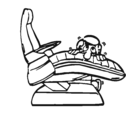Periodontal Cleanings
Pembroke Family Dental Care
Services

Periodontal Cleanings
What is Periodontal Disease?
Why Is It Important?
Sometimes, plaque (a sticky film of bacteria) and tartar (hardened plaque) build up around your gums. When this happens, it can cause gum disease, also known as “periodontitis.” Gum disease can make your gums swollen, bleed easily, and even cause your teeth to become loose. If left untreated, you could lose teeth!
A periodontal cleaning helps get rid of this buildup, which stops the gum disease from getting worse and helps your gums heal.
Who Needs a Periodontal Cleaning?
Not everyone needs this type of deep cleaning. Your dentist might recommend it if:
- Your gums are red, swollen, or bleed easily.
- You have pockets around your teeth where plaque and bacteria have built up. These pockets are spaces that form when gums pull away from the teeth.
- You have a lot of tartar that can’t be removed with regular brushing and flossing.
- You have bone loss around your teeth due to gum disease.
How Is a Periodontal Cleaning Done?
Don’t worry! The process is safe and helps protect your smile. Here’s how it works:
- Numbing the Area: The dentist will make sure your gums are numb, so you don’t feel any pain during the cleaning. They might use a gel or give you a small shot.
- Scaling: This is the first part of the cleaning. The dentist or hygienist uses special tools to remove plaque and tartar from your teeth and below the gumline. This helps get rid of bacteria that cause gum disease.
- Root Planing: Next, the dentist smooths out the roots of your teeth. This makes it harder for plaque and bacteria to stick to them in the future and helps your gums reattach to your teeth.
- Rinsing: After scaling and root planing, the dentist will rinse your mouth with an antibacterial solution to help clean away any leftover bacteria.
Sometimes, you might need more than one visit to finish the cleaning, especially if you have a lot of plaque and tartar buildup.
Does It Hurt?
How to Take Care of Your Teeth After a Periodontal Cleaning
After your cleaning, your dentist will give you tips on how to care for your teeth at home. Here are some general things you can do:
- Brush gently with a soft-bristled toothbrush at least twice a day.
- Floss daily to remove food and plaque between your teeth.
- Rinse with mouthwash to help kill bacteria.
- Avoid smoking as it can slow down the healing of your gums and make gum disease worse.
How Often Do You Need a Periodontal Cleaning?
Your dentist will let you know how often you should have a periodontal cleaning. For some people, it might be every 3 to 4 months, especially if they have ongoing gum disease. Regular check-ups will help the dentist keep an eye on your gum health.
Benefits of Periodontal Cleaning
- Stops gum disease from getting worse
- Prevents tooth loss
- Reduces bad breath caused by bacteria
- Improves overall gum health
